More Pictures and Cruising Stories
We have had a sister website running for the past 5 years which we have used to post stories and pictures up for friends, family and anyone else interested in our cruising lifestyle. Here are some extracts from the stories and a selection of pictures from this site.
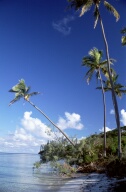
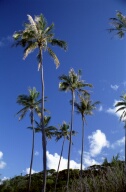
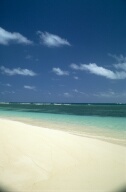
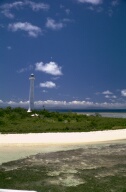
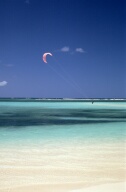
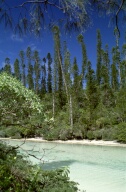
PAPUA NEW GUINEA 2003
We arrived in Budibudi, first landfall in PNG, in February and were greeted by a pod
of pilot whales, happily swimming and puffing around 'Moet'.
Budibudi is as picture perfect a coral atoll as you could imagine.
The lagoon is 3 miles wide, with a horseshoe-shaped string of 8 small islands
around the edge. The water is unbelievably clear and turquoise-coloured and full of fish, mantarays, and dolphins.
The distinction between adults and children here is not a divisive one.
Adults laugh as much as children and children learn to be responsible from a young age.
By 4 years old they are paddling their own canoes to go fishing,
climbing coconut trees and handling small bush knives. And communication
between the ages is good. The young clearly have a great respect for
the elders, and the elders let the young be. They are rarely told 'no' 'don't do that' 'be quiet' or
'go to bed' and are free to come and go as they please. The islands are safe places (bar the occasional falling coconut) and children do not need to ask permission to go anywhere. You see them playing in the water or on the beach with a handmade football or guitar until all hours.
It is an idyllic life in many ways, especially when seen at a glimpse and from the outside. The air is warm, the water is clean, the fish and fruit are plentiful. There is no pollution or crime or stresses or taxes. People need not worry about finding a job or earning money to buy a house. You want a house? You go to the bush and gather your materials. And most likely the entire village will help and it will be built in a matter of a few weeks. You need food? You go to the reef to fish, or to the gardens in the bush. And the rest of the time? Spent resting in the shade, playing, laughing, telling stories, chewing betel nut. Work and play are interrelated and not separate commodities. Groups of people, young and old, will sit on mats under the shade of a few palm trees. The men may be making spearguns for fishing or carving betelnut pounders, the women may be preparing sago, or weaving baskets, the younger children playing with crabs or trying to imitate the adults. But no one is hurried or pressured, and the sound of chatter and easy laughter prevails throughout the day.
When we took our new sail to shore to stitch it to fit (a gift from our Swiss friends on 'Summertale' which is a bigger yacht and so the sail needed a good two metres off the foot) we were immediately assisted by 2 friends, Noino (who, incidently, had a massive scar from a shark bite across the whole of his upper thigh. First shark bite the islanders could remember, he said, and outside the lagoon in deep water, so not in the waters where we would be swimming, but still it got me worried!) and Joe who sat down with needle and thread to help us handstitch the reinforcement panels on to the corners of the sail. It was slow work, as the material was so thick that in places a nail had to be driven through with a hammer to make the hole for the needle to go through, but with 4 of us we got the job done over a lesuirely 3 days, with numerous rest breaks for conversation, and to drink coconut. The day of completion coincided with Good Friday, and one man was roasting a pig for the village feast. In return for a bottle of sauce from 'Moet's stores he gave us a generous slab of meat, so we shared it with Noino, Joe and family as a treat for the help they had given us with the sail. The notion of sharing and giving gifts is so commonplace here that whilst we are in the islands we rarely use money at all.


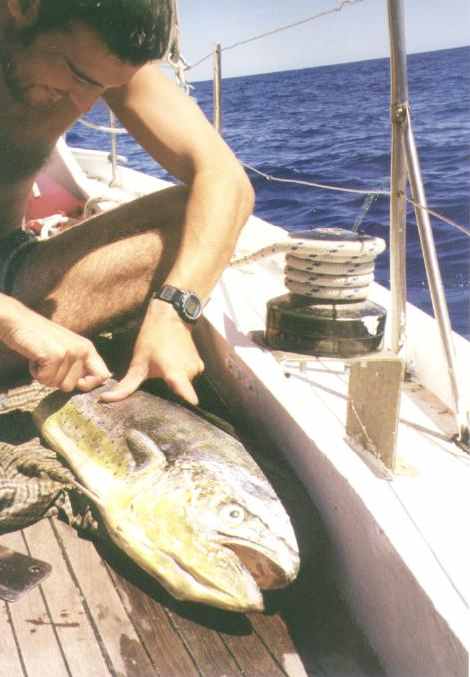



VANUATU 2002
We´ve done a fair bit of sailing since we´ve been here, some day sails and some overnighters. Sometimes flying fish will land on the deck while we are sailing at night and we´ll find them in the morning motionless with their little mouths wide open. They are amazing creatures with beautiful strong wings which can propel their bodies up and out of the water for 30 metres or more. Often we´ll be sailing and see whole shoals - or maybe flocks is more appropriate - speeding through the air just above the surface of the waves. The smallest fish to sacrifice itself on our deck was about half the size of my little finger with beautiful silver wings and big round eyes.
We´ve been to maybe 9 or 10 anchorages in Vanuatu so far and the villages are beautiful here, much more traditional than Fiji - bamboo woven walls and palm thached rooves and piglets and chickens and dogs running free all over the place nibbling on pieces of fallen coconut.
We visited one village in Pentecost after an invite from a basket-weaver named Emily who took us to her home and made lap-lap (local speciality with leaves and manioc) while we sat on the mat and talked. The people here are well educated and Emily and her husband spoke not only English, but French, Pidgin, plus 3 or 4 local languages. Pidgin is a language adapted from English and French and what the ni-Vanuatu people use to communicate with those from other islands. It is written just how it is spoken, so 'number one' in Pidgin becomes 'namba wan' which is an expression of something very good.
The markets here are excellent places, where villagers from all over the island come to sell produce from their gardens - yams, taro, sweet potato, chillies, tomatoes, limes, papaya.
Each afternoon a different group of villages arrive; the women set up their stalls and stay there until the next day, sleeping on mats on the floor at night, and sharing news and gossip with their friends. It must be one of the rare markets of this world where you can tap someone on the shoulder at 3 o´clock in the morning, wake them up, and buy a couple of coconuts!
The more remote a place, the more welcoming the reception. The Banks
islands in Vanuatu are out of the usual cruising track but an excellent
place to sail. We arrived in the bay under sail and were greeted by tribal
calls from the shore (we all called back in response) and 3 canoes paddling
alongside as we dropped anchor. Chief Henry and Chief Johnston came aboard
and invited us to hear the ladies of the village perform water music. This
is the only place in Vanuatu (and probably the entire world) to do such a
thing and we weren´t quite sure what to expect. We went to the village and
first smoked some pure leaf tobacco with Chief Johnston (very smooth, strong
flavour), then we followed the women down to the river whereby they waded
in, fully clothed, and began slapping the water into a frenzy. It sounded
incredible, like a complete drum kit with deep bass notes and high top
slapping and the women yelling and whooping. It sounds hard to believe, but
6 women standing in the river splashing about actually sounded pretty damn
good. And it was definitely music. Not that easy either, as afterwards we
all climbed in and tried it but all it sounded like was 6 people splashing
about in the water. Oh well, we´ll keep practicing... We returned the
gesture and brought the guitars to the village one evening with Shiralee,
our friends who were sailing with us. We drank kava and played our songs,
then Chief Johnston and the village boys played some island songs. One very
shy teenager had an obvious talent for the guitar, so Frans began teaching
him some reggae and blues rhythms. The next morning Chief Johnston came to
the boat and said the village had made a story about us. When we asked why
he replied that it was the first time the white man had come to the village
to make music. We felt very honoured. 'Moet' secures her reputation as the
good time boat taking the party with her around the Pacific!





SOLOMON ISLANDS 2002
We arrived in the Solomon islands in November, only 20 hours sailing from
the Torres islands in Vanuatu, and since we checked out of customs over a
week before this it didn´t really feel as if we were going to a completely
new country. How nice not to have a lengthy passage to get somewhere new!
Not to feel completely exhausted and dirty and salty but just only a little
bit sleepy and a little bit wet. And not to have to sit around and wait for
island officials to come and quarantine the boat, but to be welcomed by a
fleet of canoes and the villagers paddling by. Although the sail was only
an overnighter we definitely arrived in a new place - the first glimpse of
the settlement and we knew this was a different country. The houses were
built on raised platforms and looked instantly sturdier and larger than the
Vanuatu type. Likewise with the canoes; thicker, wider hulls and no
outrgigger, just a single hull with a beautifully carved paddle. I snapped
away with my camera to add to my study of Pacific seacraft. The best
sailing vessel yet was a small canoe, single manned and sailed by a
triangular sheet made up entirely from old umbrellas!
After the now common practice of inviting aboard the welcoming committee
with cups of tea and home baked cookies we had lunch before going to shore.
And lunch was quite an event in itself since half of the lunch had begun to
eat the other half. It makes me shudder just recalling it! A scene of utter
carnage, the 6 coconut crabs that had sailed with us from the Torres had
turned into horrific cannibalistic monsters - two had escaped from their
chains and had turned their claws and jaws to their companions. Coconut
crabs are huge, a rare delicacy, served only in the finest restaurants where
customers are charged a substansial price. We traded a kilo of rice and a
bag of sugar for ours. They have to be stabbed through the head to be
killed, but even after this they can move around for an hour afterwards,
they´re tough creatures. But they taste wonderful. We had two on the first
occasion, and liked them so much we got 6 more, one for each person on board 'Moet'. Unfortunately not all 8
were still with us by the time we were anchored in Vanikolo. We opened the
bucket and there were the remains of 4 delimbed, stinking, festering crabs
and the 2 escapees munching happily on their flesh. It was really rather
grim and not what we wanted to deal with after a sleepness night at sea,
like a scene from Braindead or something; but Anna, Rob and Frans dealt with
it admirably, albeit with occasional shrieks and grimaces of disgust.
Understandable really. We should have woken Nils up to get the footage on
film! And I will add that it was hardly as satisying eating them after
witnessing such brutality; we half expected them to come alive on our plates
and declare mutiny on the ship!
So after lunch we went to shore, after receiving a letter for 'mister frances',
welcoming us to the village. After hearing reports of
Solomon islanders being hostile, theiving and boarding boats with machetes
we got a pleasant surprise. Vanikolo island hadn´t had a yacht visit for a
whole year, so the whole village was out in full force to greet us. Faithful
(yes, his real name) was the letter writer and a very
gentle, well spoken man. He was standing as a candidate in the provincial
elections and showed us around the village. When we got to the river we
asked who lived on the other side. 'People from Tikopia?' (pronounced like
Utopia) said Faithful; 'They are Polynesians'. Which explained their
appearance. While Faithful and his village looked like the Melanesians we
had seen in Vanuatu and Fiji, these Tikopians had a distinctive Asian
appearance, fairer skin, more delicate features, and they were
much more giggly and high spirited than the more reserved Melanesians.
'Do the villagers mix?' I asked Faithful who replied that they did not.
They spoke a different language and had different customs. 'We are friends' he
said. But when I asked if there was any trouble between the villages he
smiled and said 'Sometimes. There are many Tikopians over here illegally.'
I wondered to myself what he would do about that if he won the provincial
elections, and decided if Melanesian officialdom was anything to go by,
probably nothing.
Being in this anchorage where they haven´t seen a yacht for a long time
makes me aware of how just a few visitors from a country can really influence
and shape islanders impressions of the outside world. All day long we have
had visits from villagers in canoes eager to check us out (we were planning
to go to shore ourselves but the torrential rain kind of dissuaded us) so we
have been talking and making endless cups of tea and cordial. Peter (the
chief's brother) told us stories of old warriors and traditions of the island
as he spoke through red betel stained teeth. He then said how much he liked
us. 'Some people on the yacht, they tell us to go away' he made a shooing
motion with his hands. 'They are not nice like you people. They don´t let
us come to the boat.' We explained that there has been many stories
circulating among cruisers about attacks in the Solomons - boats being
boarded at night by 5 men with machetes, people killed, women raped,
equipment stolen, so that may be why people tell the islanders to go away,
for they are afraid. I also thought, but didn´t say, because it would be
difficult for Peter to understand, that many people are so precious about
their boats that they don´t like unwelcome hands on the fibreglass they have
been so carefully polishing. What we have to realise is that every
encounter we have is shaping the attitudes of the islanders towards
subsequent boats that come in. If a yachtie is hostile, then the islanders
will not be so friendly to the next yacht in the bay. We try to leave a
happy wake behind us so that the next boat to arrive will be treated as well
as we have been. And in turn, we are treated better for being welcoming to
those first canoes. Peter has invited us to the ordination of a priest in
the next village where there will be an all day celebration and feast - this
woudn´t have happened if we had told people not to touch our boat! Peter
said that there were fines in his village of 100 dollars if anyone stole
anything from a yacht, even just a piece of rope. These really are some of
the kindest and most welcoming people we have met - and there were those in
Fiji who thought we were crazy to come here! It is such a shame that fear
blunts people to some of the most unique experiences.




|